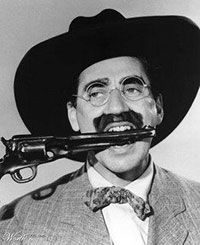A - B - C - D - E - F - G - H - I - J - K - L - M - N - O - P - Q - R - S - T - U - V - W - X - Y - Z

Origin of Phrases - B
Bite the Bullet
Meaning: Pay a painfull price and move on.
Example: If you want to clear those 8 tickets off your driving record, you will need to bite the bullet and pay the fines.
Origin: When U.S. Civil War casualties were carried off the field with a mangled arm or leg, the soldiers couldn't turn away when a surgeon with a bloody apron approached with a scalpel or a saw. Sometimes, the supply of painkillers and whiskey had run out, forcing the medics to place a soft-lead bullet in the patient's mouth. It wasn't much, but it made amputation a little easier to bite the bullet instead of lying on the table screaming.
Before the advent of ether, the first anesthetic, surgery was a pretty desperate and painful affair. With the patient (although victim might be more descriptive) fully conscious and feeling the pain. These early surgeries were typically limb amputations or the removal of some object lodged into the body such as a bullet or arrowhead.
A typical amputation consisted of the "surgeon" using a saw to hack off the unwanted limb. The skin was then pulled down over the stub and sutured shut. Amazingly, some of these patients survived, but certainly the success ratio was low. Note that poorly skilled physicians today are called "hacks".
Even after the advent of anesthetics such emergency surgery has had to be performed at times. Particularly in times of war when anesthetics may be in limited supply or unavailable.
To ease the pain the patient was given a couple of stiff belts of whiskey to numb the senses, then given a stick or lead bullet to bite down on as the surgeon went to work with knife and saw.
The bullet or stick was given to let the patient focus their energy and attention on the biting instead of the cutting and pain. It may also have helped to reduce the screaming, which probably benefited the surgeon and attendants.
Why bite on a bullet? Made of lead, bullets are malleable. Although quite strong they will actually deform somewhat when bitten hard. Hence teeth would not break as would likely happen from biting a stone for example. Bullets are also readily available in times of war, when this type of surgery is frequently called for. "Bite the bullet" may have originated in the civil war.
The patient who bit the bullet was cooperating with the surgery. Clearly this poor fellow saw the surgery as unavoidable and absolutely necessary. He had decided to "bite the bullet" and get on with the surgery. "Biting the bullet" has been captured in countless war movies and westerns.
Alternatively, In the early 1800's, when Britain ruled India, there were many Muslim and Hindu auxiliary soldiers attached to the British military units. At this time bullets were constructed of paper cartridges that had to have one end torn off before being placed into the musket. Because one hand was holding the musket, and the other the shot, the easiest way to tear the end off was to do it with your teeth.
But the cartridges were lubricated with the fat of pigs, to allow them to slide into the barrel of the musket more easily. Both Muslim and Hindu soldiers were forbidden by religion to touch, much less ingest the meat of a pig.
They would refuse to bite off the end of the bullet because of the pig fat grease. The British officers insisted that they do so anyway, and the orders " they'll just have to bite the bullet" eventually entered the vernacular.
An interesting tale - but the paper did not contain the bullet, only the gunpowder. The bullet was loaded separately.